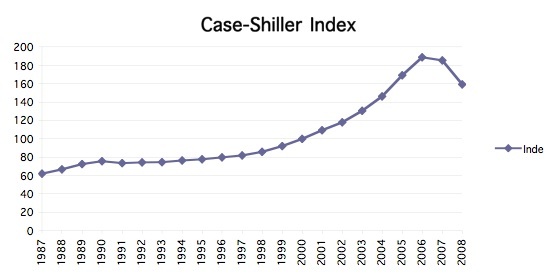Tweet [1]
I have mentioned the argument of Robert Shiller’s [2] that the housing boom of the last ten years was a bubble, a result of social contagion. [3] So what I have been doing over the last week is educating myself. Not being a housing expert, I’ve been digging around, trying to find out the role of government in the housing market and how it might have changed since 1997 when the "bubble" took off to see what role public policy might have had in the housing price increases and the subprime meltdown. Maybe it wasn’t speculative mania. Maybe much of it was due to changes in public policy.
[3] So what I have been doing over the last week is educating myself. Not being a housing expert, I’ve been digging around, trying to find out the role of government in the housing market and how it might have changed since 1997 when the "bubble" took off to see what role public policy might have had in the housing price increases and the subprime meltdown. Maybe it wasn’t speculative mania. Maybe much of it was due to changes in public policy.
I am embarrassed to say that I missed a huge factor. Reader (and EconTalk listener) Russ Wood pointed out that in 1997, the tax on capital gains for housing was dramatically relaxed. As a real estate site [4] describes the change, looking back from the present:
- First, by now you should have long ago forgotten the old $125,000
tax exclusion on capital gains for home owners older than 55 and the
"rollover" law that allowed you to defer paying capital gains taxes
provided you purchased another, more expensive home in time.Those laws are history. Forget them.
- The relief act’s primary provision for home sellers is the capital gains tax exclusion [5]
— when you sell your home, if you qualify, you can keep, tax free,
capital gains of up to $500,000 if you are married filing jointly or
$250,000 for single taxpayers, or married taxpayers who file separately.
Do you think that had any effect on the price of housing? You bet it did. Vernon Smith pointed out the impact [6] in December 2007:
The joint housing and mortgage-market crisis once again reminds us
that all financial implosions stem from the same cause: borrowing short
and lending long without enough equity to weather periodic storms in
the gap between.But this bubble was different. Besides being fueled by housing
purchases and repackaged loans, each with inadequate equity — doubling
down with other people’s money — at the end of the capital-gains
rainbow was the right to take up to $500,000 of profit, tax free.Thank you President Bill Clinton for your 1997 action, applauded by
the banks, the realtors and all citizens in search of half-millionaire
status from an investment they could understand and self deceptively
believe to be low risk; thank you for fueling the mother of all housing
bubbles; thank you for enabling so many of us who bought second or
third homes, and homes before construction began, which we then sold to
someone else who dreamed of riches from owning homes long enough to
sell to another fool.Once again, try as we might and in spite of our political rhetoric,
we have failed to help the poor in applauding government action
intended to help ourselves.The consumption binge is now over, and there is more than enough
blame and souring loans to spread around. Congress, if its members can
stop squabbling, wants desperately to sanctify it all with actions sure
to launch at some future date the grandmother of all housing and
mortgage-market bubbles. This august body has long forgotten that it
set the stage for housing bubbles by creating those implicitly
taxpayer-backed agencies, Fannie Mae and Freddie Mac, as housing
lenders of last resort.Financial market innovators who invented securitization as a
mechanism for creating a liquid national market for mortgages are now
criticized for having caused an "agency problem." This is jargon for
management not having good incentives to provide investors with "truth
in packaging" of the underlying economic risk. But what does truth
matter at the height of a bubble? These critics would solve the agency
problem with more government regulation. Excuse me, but does not the
political process have the biggest agency problem of all?
And Chris Farrell at Business Week did a very nice job [7] discussing it back in 2005:
What accounts for the housing boom? Economists have cited a number of
fundamental factors, including low interest rates, favorable
demographics, and restrictions on development. But the unappreciated
force that may have infected a strong housing market with home-buying
mania is bad tax policy. Specifically, I mean the Taxpayer Relief Act
of 1997, signed by President Clinton.
He continues with the real cost:
…capital gains on
stocks and bonds carry a 15% levy (the capital gains tax rate had been
20% until the tax law change of 2003.). The powerful lure of tax-free
profit is one reason that home prices have risen at a nearly 7% annual
rate, vs. about 4% for the stock market since 1997. Sell a home with a
$500,000 profit and owe Uncle Sam nothing. But realize a $500,000 gain
on Nextbreakthroughtechnology.com and the federal government takes 15%.
That’s the kind of math most people can figure out.
The issue goes way beyond tax fairness. A growing number of
economists are deeply concerned that residential real estate is
absorbing far too many economic resources. Money is pouring into
concrete foundations rather than high-tech innovation. "Residential
investment accounted for 35% of private investment in the past year, a
level not seen since the early 1970s," notes Martin Barnes, the
perceptive financial-market observer at Bank Credit Analyst.